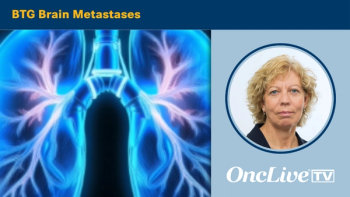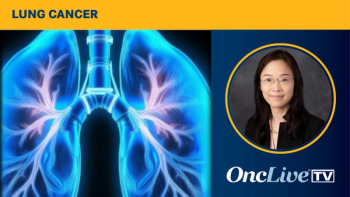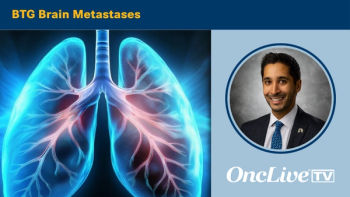
Up-front Treatment Options for Squamous NSCLC
Transcript:Benjamin P. Levy, MD: Let’s move, finally, in this section to treatment options for first-line. We have a new FDA approval for a monoclonal antibody for first-line for squamous cell. I would argue that for first-line regimens, there are competing strategies. We’ve got cisplatin/gemcitabine, the histology story woven from the very large study comparing cisplatin/pemetrexed versus cisplatin/gemcitabine. We’ve got carboplatin/Abraxane showing a response rate in a subset analysis north of 40% from data when it was compared to carboplatin/Taxol. We have carboplatin/Taxol. We also have cisplatin/gemcitabine/necitumumab. These are all options here. Mark, I’ll turn to you first. How do you distill this all down, and what do you do in clinical practice?
Mark G. Kris, MD: To me, again, I’m old school. Cisplatin would still be the basis. And then, what you add with it, we really don’t have good data. If you want to add a taxane or you want to add gemcitabine, I have to say both of them are reasonable choices. And it’s really hard to tell them apart. If I had to add a taxane, I’d add albumin-bound paclitaxel, basically because of the hypersensitivity problem and the need for the extra steroids. It just takes that away, and the data is that it’s clearly no worse. Some people might say it’s better, and I would go with that. I think it’s pretty hard to tell cisplatin/taxane versus cisplatin/gemcitabine.
Benjamin P. Levy, MD: And what about necitumumab? Where do you see necitumumab fitting into all of this?
Mark G. Kris, MD: Well, we’re going to get a little philosophical here. The drug is approved in the United States. The benefit in overall survival, upon which the approval is based, is approximately 1 month. A few years back, that 1 month wasn’t enough to get cetuximab approved. Suddenly, it’s enough to get necitumumab approved, and it is a month. It is what it is. It’s a tough call. I’ll have to say at my own institution, most of my colleagues have not chosen to give it. I’d give it, by the way.
Benjamin P. Levy, MD: Okay. If there was a reasonable molecular enrichment strategy, we’ve seen some hints about H-score that didn’t seem to pan out. We have some EGFR copy number by FISH, perhaps being predictive of outcome. I guess you use it, but would it sway your institution more?
Mark G. Kris, MD: It would help, but I think it ultimately boils down to your pact with your patient. Some folks ask very clearly for this kind of treatment, any additional thing that can be added despite the toxicity, which is real, and despite the lack of a huge benefit. And for those patients it’s okay. For other patients, it’s not okay. And other things, Sarah brought it up, too, about the hair loss. To me, that’s a big reason to try gemcitabine over a taxane for a lot of different patients. Other patients don’t really care, and you just have to get their advice on that.
Benjamin P. Levy, MD: Sarah, your thoughts?
Sarah B. Goldberg, MD, MPH: I brought this up earlier. Schedule is important. The nab-paclitaxel and gemcitabine are weekly, whereas paclitaxel is every 3 weeks. I’m not trying to keep patients away from me. I’m happy to see patients as often as they want to come, but the sense is that patients are happy to only have to come in once every 3 weeks. When you don’t have survival benefit, or you don’t know if there’s a difference, it’s an every-3-week schedule. But it’s a point to discuss. I guess it’s a point for discussion with patients if weekly is hard for them. If they’re coming from far away, it might be something to consider, a regimen based on that.
Mark G. Kris, MD: I’ll tell you a secret though. Take your patient who you treated weekly, and then over 3 months, see how many doses they got. They got the equivalent of one dose every 2 weeks. That’s what they got.
Sarah B. Goldberg, MD, MPH: They’re still coming in to try to get the dose.
Mark G. Kris, MD: Yes, but not if you give them one dose every 2 weeks.
Sarah B. Goldberg, MD: So, you adjust the schedule.
Mark G. Kris, MD: Absolutely.
Sarah B. Goldberg, MD: That’s a different story.
Mark G. Kris, MD: Yes. But if you give the one every 2 weeks, you give the same amount of drug if you give that usual day 1, day 8, because you wind up…
Sarah B. Goldberg, MD, MPH: It winds up being that anyway with toxicity. I agree.
Mark G. Kris, MD: The same with the taxanes. I have to tell you, one of the worst things for a patient is to come and not be treated, particularly in New York City where you have to pay $55 to park your car—and we can’t take that back. But I ask you to look at that if you don’t think that this is the right thing to do. That’s what you’re doing. The same is true for Abraxane, by the way.
Sarah B. Goldberg, MD, MPH: Right. So, I think part of it’s the schedule and discussing that and then part of it is the side effects. I think about necitumumab, or even ramucirumab, in second-line or third-line.
Mark G. Kris, MD: In gastric, they give it every 2 weeks, and that’s what I do.
Sarah B. Goldberg, MD, MPH: I think toxicity discussion, schedule discussion. When you don’t have survival data, it’s hard to say this is clearly…
Mark G. Kris, MD: Once again, I can’t believe that it would work in gastric and not in lung.
Benjamin P. Levy, MD: So, again, I think you need to be a leader in making a decision, but this can elicit shared decision making by talking with the patient. There are competing strategies. I haven’t used necitumumab yet. I would like to try and use it. It is one of the only studies, to my mind, looking at a maintenance strategy in first-line squamous in combination with platinum. Ten percent of those patients were ECOG 2, which is somewhat representative of my patient population—so it’s safe. But we’ve been very encouraged with the carboplatin/Abraxane data, and we’ve had a lot of patients on clinical trials. I think it is a discussion that you have with your patient, but the points are well taken on the panel in terms of how they approach this therapeutic decision.
Transcript Edited for Clarity



































